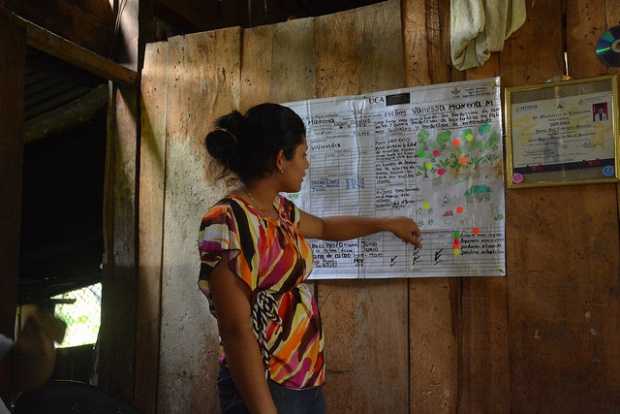Evelin Mairena smiles with her eyes and takes good care of her guests, with coffee and rosquillas, corn flour cookie. Her “finca” of dreams is mounted on the wall for us. The diagrams, sketches and data show what her farm should look like, a product of local conditions research, and past and current experience with crops.
Living in the Wasaka Abajo community, part of the El Tuma-La Dalia Climate-Smart Village (CSV) supported by the CGIAR Research Program on Climate Change, Agriculture and Food Security (CCAFS) Latin America and its partners, she and her family want a more diverse farm, focusing on cocoa but complementing with dairy production, better vegetable yields, more fruit trees and a better canopy to manage shadow for the cocoa.
This continues to be the idea behind the CSV: working with the farmers to see what works and what doesn’t, understanding their perception of climate change and finding the best approach for adaptation and mitigation.
This finca of dreams is still very well rooted in reality, with the farmers being able to identify their obstacles and opportunities.
In Evelin’s case, it’s limited land, limited labour available and not enough finance, while having trouble with too much rain when harvest time comes. But learning more about crop management is an opportunity her family is aware of.
The practices envisioned for her farm fall into four categories: they generate more income, they require more investment, they produce food and they are climate change adaptation practices.
But it’s not just plans. Things are happening in El Tuma, either when it comes to growing several varieties of beans or cocoa that has potential for export, which would generate increased incomes. Gaspar Mairena gives us a tour of his still small cocoa plantation; his crop goes to a cooperative and from there towards national consumption.
The potential is there: a mapping of cocoa quality in Nicaragua showed that Matagalpa, the department containing the CSV, has some of the best original cocoa varieties (criollos). Central America has gained the spotlight as the future source of cocoa beans, as leading cocoa producing nations in Africa are threatened by climate change.
From Wasaka Abajo we travel to Aguas Amarillas, also part of the El Tuma – La Dalia CSV. Wilder Salgado has his own dream farm, a finca that revolves around coffee. He walks us through the shrubs that grow under the shadows of banana trees and other species – he uses an agroforestry system for coffee – where the cherries take their time to ripe and the harvest is done in steps.
Wilder’s next goal is to know more about coffee crop management, as well as about growing vegetable by continuing to attend the schools for farmers organized through the CSV project.
His plans for 2018 and 2019 are already up the wall and include: finishing renovating his coffee crop, building a tank to save water, plant more fruit and forest trees, and grow more vegetables in his patio.
The garden behind the house slopes smoothly next to the corn field and is getting richer with vegetables and herbs – tomatoes, lettuce, basil or aubergines are just a few catching our eye.
In Aguas Amarillas it also rains too much during the harvest, hurting small farmers’ maize and beans yields. Excessive rainfall also hurts coffee and cocoa, as it stimulates development of fungus and other diseases.
All farmers in the CSV have their dream finca, drawn out with support from CCAFS, the Tropical Agricultural Research and Higher Education Center (CATIE), Universidad Centroamericana (UCA) and Nitlapan; some raise animals, some want to increase the surface they plant with bananas, others focus on commodities such as coffee and cocoa, while providing food for their family.
Reaching their goals also involves a continued collaboration with these organizations to constantly monitor their practices and build upon their experiences, while adapting to the challenges of climate variability.


















